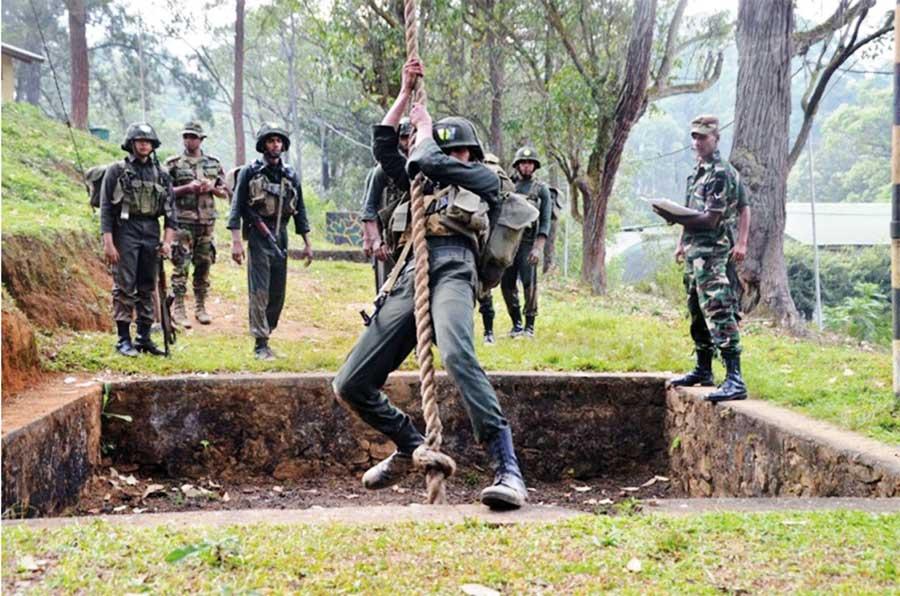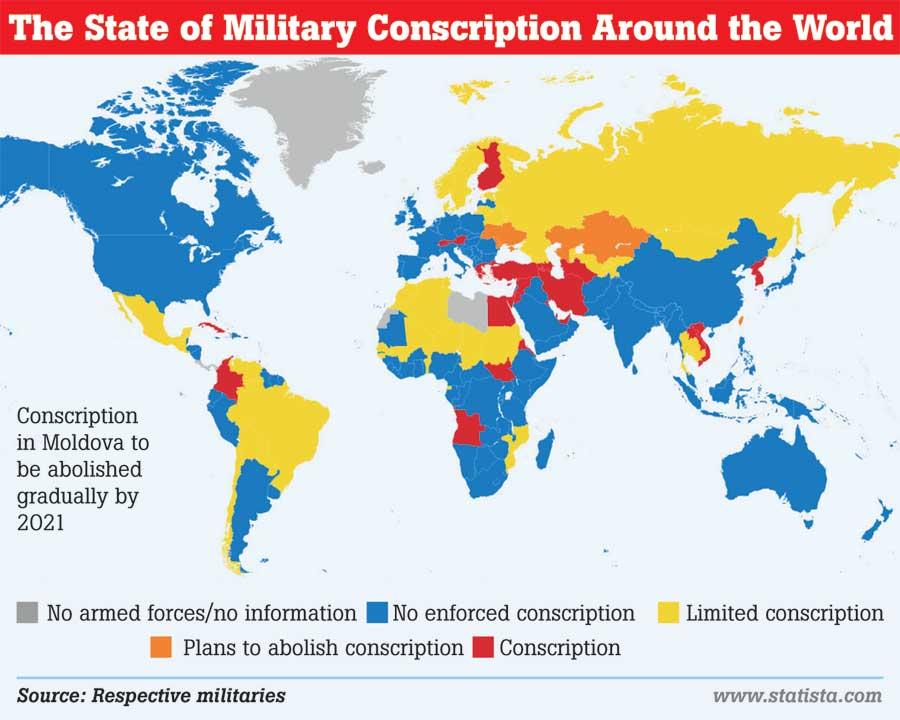Reply To:
Name - Reply Comment

Military training conducted by Sri Lanka Army
- On the other hand, some countries such as Sweden have reinstated compulsory military service since 2017
- In Norway, conscription requires 70% of Norwegian males to invest one year of their lives in military service
Public Security Minister Rear Admiral (Retired) Sarath Weerasekara recently proposed in Parliament that youth above 18 years should be conscripted into military service. One of the main objectives is to instill  discipline among civilians and encourage leadership qualities. He said that nobody should fear about a military training and that it is an attempt to take a step closer towards establishing a law-abiding nation. However the duration of training, intensity and other criteria are yet to be known. Several other countries too have military conscription and some are gender inclusive as well. But one of the key areas to focus is the long-term impact of military training in a country that is largely exposed to violence.
discipline among civilians and encourage leadership qualities. He said that nobody should fear about a military training and that it is an attempt to take a step closer towards establishing a law-abiding nation. However the duration of training, intensity and other criteria are yet to be known. Several other countries too have military conscription and some are gender inclusive as well. But one of the key areas to focus is the long-term impact of military training in a country that is largely exposed to violence.
A thing of the past
Conscription, also known as draft is the compulsory enrollment for service in a country’s armed forces. The origins of military conscription date back thousands of years to ancient Mesopotamia, but the first modern draft occurred during the French Revolution. Modified forms of conscription were used by Prussia, Switzerland, Russia and other European Countries during the 17th and 18th Centuries. Before the existence of a warrior class or military elite, Babylonian kingdoms employed a system of conscription called ilkum, in which labourers owed military service to royal officials for the right to own land. Provisions for ilkum were created under the ancient Code of Hammurabi, one of the earliest and most complete legal codes, instituted under Babylonian King Hammurabi. Land-owning peasants often were required to provide one man per family for military duty. After the French monarchy was overthrown in 1789 the French government in 1793 decreed a leveé en masse, which conscripted into military service all unmarried, able-bodied men between the ages of 18 and 25. The United States first instituted military service during the American Civil War. The Civil War Military Draft Act of 1893 called for the registration of all males between 20 and 45 but the obligation fell mostly on the poor.
What about women?
When one thinks of the military, it’s mostly attributed to men. But there are many examples to show that it’s not only a man’s cup of tea. In Sri Lanka alone, many women have braved military exercises and have reached higher ranks. But a study done by the Pew Research Centre, a nonpartisan fact-tank that informs the public about issues, attitudes and tends shaping the world shows that fewer than a third of the world’s countries draft people into their militaries. Apart from that, most countries with a current military draft limit it to men.
At least 11 out of 60 countries with active conscription programmes draft both men and women. Besides Israel, five other countries (Eritrea, Mali, Morocco, North Korea and Tunisia) conscript women as part of universal military service schemes; five (Benin, Cape Verde, Mozambique, Norway and Sweden) have selective service systems that encompass men and women. It was also found that several countries such as Albania, Ecuador, Jordan and Poland have suspended or abolished conscription in recent years. Although Taiwan had stopped drafting men last year, conscription remains in the books and could be reinstated if there aren’t enough volunteers.
On the other hand, some countries such as Sweden have reinstated compulsory military service since 2017. This is the same in Morocco, a country that ended its draft in 2006, but reinstated it in 2018. In both these countries, men as well as women are subject to being called up.
Psychology of conscription
As a country that was tormented by a 30-year civil war, the psychological burden of the conflict is still being felt. With inadequate facilities for rehabilitation and a largely ignored psychological service system one has to firstly understand what it would mean to send youth for military training. The proposal has to be clear about access to arms, intensity of training and duration. Given these considerations, many psychologists feel that it is too early to comment.
In Norway, conscription requires 70% of Norwegian males to invest one year of their lives in military service. In a cross-sectional study of mental health using the 12 item General Health Questionnaire the case prevalence was 48%. This was remarkably high given the fact that the study population had been screened for mental diseases and a large number of recruits also had been excluded after identifying symptoms of mental illnesses. Statistical analyses indicated that the high case prevalence was due to situational factors. Social relations with officers, peers and family, structural factors inherent in the system of obligatory military service, the meaningfulness of daily tasks and financial problems were identified. It was concluded that recruits needed help to cope with complex psychosocial and transactional challenges of military service.
A study done by Paula Boros et al., at Nova Southeastern University, USA investigated the effects of military service on personality and psychological well-being. The research concluded showing how clinical therapeutic interventions could have a positive impact on military personnel and the system.
Another study on the long term effect of military conscription on personality and beliefs by Gabriela Ertola Navajas et al., at University of San Andres found that men who served in conscription are more likely to adapt the military mindset and the effect is long-lasting. In particular, men who served in conscription were more likely to justify violence to solve conflicts, believe that military service should be mandatory, support coups against civilian governments and support the right to bear arms.

Mixed opinions from public The Daily Mirror also sought public opinion on this proposal and here’s what they shared with us via our social media channels:
No discrimination
It’s a good move as long as implemented properly; this should include all youth, including the rich, politicians and poor without any discrimination.
– Ismail Kassim
Destroying creativity
A year of obedience (military style) will destroy creative processes and strengthen other neural pathways to form habits of conformity. That will be the end of the road for many budding inventors, artists and software developers, etc. Not to mention the de-motivated medical college hopefuls, some of whom will never bounce back to serious study.
– Varuni Fernando
Train in different disciplines
This should be done by the will of the people. Not some random politician’s will. Again those who wish to have this training should be enlisted and then trained in different disciplines including engineering, construction, manufacturing, social services, healthcare and the like.
– Kanishka Liyanage
Compassion and empathy?
18 is too late to discipline anyone, and there are other more important attributes missing in our society like compassion and empathy. Invest in developing these attributes, and then we won’t need a big military! And invest in higher education to ensure all Lankans have access to it!
– Saanchika weerasinghe
Give a sound education to children first
Not practical. There are more issues in our country that need the finances used for this type of training. It’s going to be a costly affair isn’t it? Let’s give ALL our children a good, sound primary and secondary education first and then think of giving them a military training. On the other hand, if instilling discipline is the sole purpose of this military training, may I suggest that discipline be instilled in the children from the nursery itself. For that to succeed, the teachers who teach these children and their parents should have a sense of discipline in their lives. I suggest that we put all these adults through a course of military training instead!! Then automatically, the youth and children of our country will get disciplined.
– Anoma Wickremasinghe
Other options
You have families, schools and religious institutions to teach discipline. It’s not the military that should be doing it.
– Wageesha Samaraweera